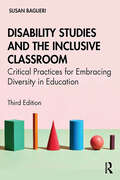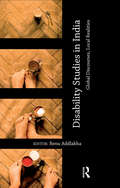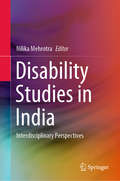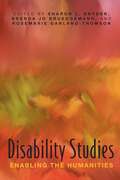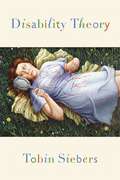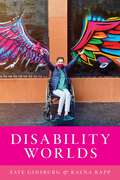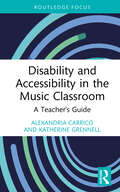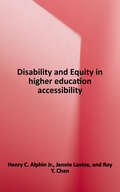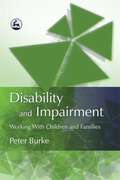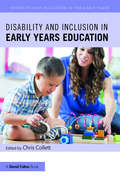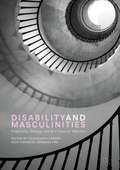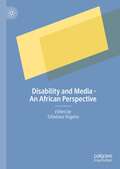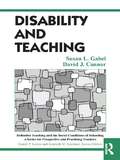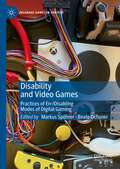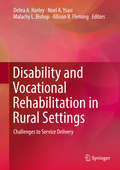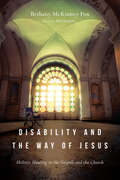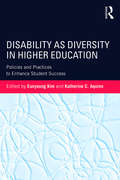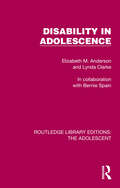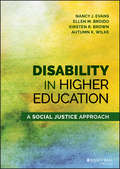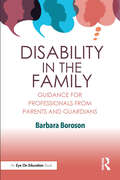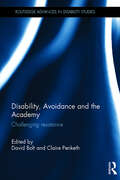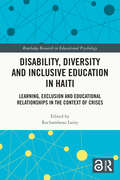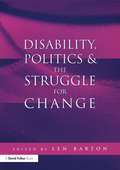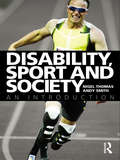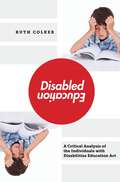- Table View
- List View
Disability Studies and the Inclusive Classroom: Critical Practices for Embracing Diversity in Education
by Susan BaglieriDisability Studies and the Inclusive Classroom integrates knowledge and practice from the fields of disability studies and special education to provide readers with a comprehensive understanding of inclusive education. Now in its third edition, this critical volume has been revised and updated to include expanded discussion of disability models and contemporary perspectives on disability. Each chapter features a dilemma to capture the complexities of the field of educational practice to inspire critical thinking and contemplation of inclusive education.
Disability Studies in India: Global Discourses, Local Realities
by Renu AddlakhaSince the 1970s, the international disability rights movement, the United Nations and national governments across the world have attempted to ameliorate the status of the disabled population through a range of legislative and policy measures primarily in the areas of health, education, employment, accessible environments and social security. While the discourse in the disability sector in India has shifted from charity and welfare to human rights and entitlements, disability studies — as an interdisciplinary academic terrain that focuses on the contributions, experiences, history and culture of persons with disabilities — has not yet taken root.This volume collates some of the most recent pioneering work on disability studies from across the country. The essays presented here engage with the concept of disability from a variety of disciplinary positions, sociocultural contexts and subjective experiences within the overarching framework of the Indian reality. The contributors — including some with disabilities themselves — provide a well-rounded perspective, in shifting focus from disability as a medical condition only needing clinical intervention to giving it due social and academic legitimacy.This book outlines key issues that would be germane to any disability studies endeavour in India and South Asia, and will appeal to academics, activists, institutions, laypersons and professionals involved in social welfare, sociology, disability studies, women’s studies, psychiatry, rehabilitation, and social and preventive medicine.
Disability Studies in India: Interdisciplinary Perspectives
by Nilika MehrotraThis book examines the state of art in disability studies, focusing on the Indian context, as well as the broader South Asian situation. It presents interdisciplinary perspectives on the basic idea, evolution, practices and challenges of researching and teaching disability studies at various higher education institutions and in other civil society spaces. The chapters address a range of related themes, including activism, development policies, research, pedagogy, spatial and social access, caste and gender representations and rights-based discourses. Given the scope of its coverage, the book is of interest to scholars and students in area of humanities, education, law, sociology and social work, political science development and disability studies.
Disability Studies: Enabling the Humanities
by Brenda Jo Brueggemann Sharon L. Snyder Rosemarie Garland-ThomsonImages of disability pervade language and literature, yet disability is, as the volume's introduction notes, "the ubiquitous unspoken topic in contemporary culture." The twenty-five essays in Disability Studies provide perspectives on disabled people and on disability in the humanities, art, the media, medicine, psychology, the academy, and society.Edited and introduced by Sharon L. Snyder, Brenda Jo Brueggemann, and Rosemarie Garland-Thomson and containing an afterword by Michael Bérubé (author of Life As We Know It), the volume is rich in its cast of characters (including John Bulwer, Teresa de Cartagena, Audre Lorde, Oliver Sacks, Samuel Johnson, Mark Twain, Walt Whitman); in its powerful, authentic accounts of disabled conditions (deafness, blindness, MS, cancer, the absence of limbs); in its different settings (ancient Greece, medieval Spain, Nazi Germany, the modern United States); and in its mix of the intellectual and the emotional, of subtle theory and plainspoken autobiography.
Disability Theory
by Tobin Siebers"Disability Theory is just the book we've been waiting for. Clear, cogent, compelling analyses of the tension between the 'social model' of disability and the material details of impairment; of identity politics and unstable identities; of capability rights and human interdependence; of disability and law, disability as masquerade, disability and sexuality, disability and democracy---they're all here, in beautifully crafted and intellectually startling essays. Disability Theory is a field-defining book: and if you're curious about what 'disability' has to do with 'theory,' it's just the book you've been waiting for, too." ---Michael Bérubé, Pennsylvania State University. "Disability Theory is magisterially written, thoroughly researched, and polemically powerful. It will be controversial in a number of areas and will probably ruffle feathers both in disability studies as well as in realms of cultural theory. And that's all to the good." ---Michael Davidson, University of California, San Diego. "Not only is Disability Theory a groundbreaking contribution to disability studies, it is also a bold, ambitious and much needed revision to a number of adjacent and overlapping fields including cultural studies, literary theory, queer theory, and critical race studies. Siebers has written a powerful manifesto that calls theory to account and forces readers to think beyond our comfort zones." ---Helen Deutsch, University of California, Los Angeles. Intelligent, provocative, and challenging,Disability Theory revolutionizes the terrain of theory by providing indisputable evidence of the value and utility that a disability studies perspective can bring to key critical and cultural questions. Tobin Siebers persuasively argues that disability studies transfigures basic assumptions about identity, ideology, language, politics, social oppression, and the body. At the same time, he advances the emerging field of disability studies by putting its core issues into contact with signal thinkers in cultural studies, literary theory, queer theory, gender studies, and critical race theory. Tobin Siebers is V. L. Parrington Collegiate Professor, Professor of English Language and Literature, and Professor of Art and Design at the University of Michigan.
Disability Worlds
by Faye Ginsburg Rayna RappIn Disability Worlds, Faye Ginsburg and Rayna Rapp chronicle and theorize two decades of immersion in New York City’s wide-ranging disability worlds as parents, activists, anthropologists, and disability studies scholars. They situate their disabled children’s lives among the experiences of advocates, families, experts, activists, and artists in larger struggles for recognition and rights. Disability consciousness, they show, emerges in everyday politics, practices, and frictions. Chapters consider dilemmas of genetic testing and neuroscientific research, reimagining kinship and community, the challenges of “special education,” and the perils of transitioning from high school. They also highlight the vitality of neurodiversity activism, disability arts, politics, and public culture. Disability Worlds reflects the authors’ anthropological commitments to recognizing the significance of this fundamental form of human difference. Ginsburg and Rapp’s conversations with diverse New Yorkers reveal the bureaucratic constraints and paradoxes established in response to the disability rights movement, as well as the remarkable creativity of disabled people and their allies who are opening pathways into both disability justice and disability futures.
Disability and Accessibility in the Music Classroom: A Teacher's Guide (Modern Musicology and the College Classroom)
by Alexandria Carrico Katherine GrennellDisability and Accessibility in the Music Classroom provides college music history instructors with a concise guide on how to create an accessible and inclusive classroom environment. In addition to providing a concise overview of disability studies, highlighting definitions, theories, and national and international policies related to disability, this book offers practical applications for implementing accessibility measures in the music history classroom. The latter half of this text provides case studies of well-known disabled composers and musicians from the Western Art Music canon from the Middle Ages to the Twentieth Century as well as popular music genres, such as the blues, jazz, R&B, pop, country, and hip hop. These examples provide opportunities to integrate discussions of disability into a standard music history curriculum.
Disability and Equity in Higher Education Accessibility (Advances In Educational Marketing, Administration, And Leadership Ser.)
by Roy Y. Chan Henry C. Alphin Jennie LavineEducation is the foundation of almost all successful lives. It is vital that learning opportunities are available on a global scale, regardless of individual disabilities or differences, and to create more inclusive educational practices. Disability and Equity in Higher Education Accessibility is a comprehensive reference source for the latest scholarly material on emerging methods and trends in disseminating knowledge in higher education, despite traditional hindrances. Featuring extensive coverage on relevant topics such as higher education policies, electronic resources, and inclusion barriers, this publication is ideally designed for educators, academics, students, and researchers interested in expanding their knowledge of disability-inclusive global education.
Disability and Impairment: Working with Children and Families
by Peter BurkeDisability and Impairment introduces professionals working with families to the everyday issues faced by disabled people of all ages in family life. Peter C Burke shows how social attitudes shape the world of the 'disabled family' either positively or negatively and the effects of stigma. He demonstrates the normality of disability - that children are children whatever their label - and the need for a sensitive professional understanding of the impact of both physical and learning disabilities on family members, in order to improve their quality of life. This book covers the spectrum of disability issues, and offers information and advice for professionals working with families and disability, explaining the value of family support, how to validate the feelings of siblings with disabled brothers and sisters, tackling social exclusion and understanding the role of lifelong professional help. Case studies and practice notes make this an accessible reference for social work students and practitioners.
Disability and Inclusion in Early Years Education (Diversity and Inclusion in the Early Years)
by Chris CollettDisability and Inclusion in Early Years Education supports practitioners in understanding and implementing inclusive practice relating to disability in early years education. Offering a detailed explanation of recent developments in the field, such as the 2015 SEND Code of Practice, it provides straightforward and accessible guidance on implementing the crucial procedures that help to promote good practice. More broadly, the book provides guidance on creating a fully inclusive early years environment that will support all children, focusing on high-incidence needs around communication, behaviour and learning. Chapters offer a wealth of practical tools and strategies to support the inclusion of children with disabilities more effectively, covering key topics such as: assessment, early identification and individualised learning working with parents, carers and families the key role of picture books multisensory approaches to learning supporting behaviour and communication This text will be valuable reading for all early years practitioners and students who want to promote the inclusion of children with SEND in mainstream provisions.
Disability and Masculinities
by Barbara Pini Cassandra Loeser Vicki CrowleyIn recent years, attending to diversity in the cultivation of embodied identity has been given additional impetus as a result of intersectionality theory. Despite this, a key gap remains in terms of knowledge about masculinity and disability. This book addresses this lacuna through ten empirical chapters organised through the inter-related themes of corporeality, pedagogy and the critique of otherness. Each of the chapters positions the subject of masculinity and disability as a site of cultural pedagogy by affirming different ways of knowing of masculinity beyond dominant ideologies that normalise a particular masculine body and relegate disabled masculinities to the position of abnormal 'Other'. Part One focuses on pedagogy. Through the materialities of 'medicalized colonialism', imprimaturs of 'relational genealogies', 'compounding differences' and an analytical exposition of some of the neo-colonial conditions of the Global South within spatially-considered places of the Global North, Chapter 1 examines the denial of human rights to the Indigenous Anishinaabe community of Shoal Lake 40 in Canada. Chapter 1 theorises masculine corporeality in terms that take seriously First Nations', national and transnational body politics seriously. Chapter 2 examines the ways that movement and affect serve as a form of pedagogy for boys with autism spectrum in schools. Part Two's focus on corporeality includes an examination of the nexus of disability and diagnosis in the context of transgender men's experiences of mental health, and a discussion of the ways that intersex individuals who identify as men and have experienced 'genital normalising surgery' actively negotiate pluralised masculinities. The focus on media in Part Three encompasses a study of the mis-interpellation of the disabled male subject in Australian male literature, research on the discursive strategies utilised in media representations of disabled veterans in Turkey, and an analysis of the political implications of depictions of masculinity, disability and sexualities in a variety television program. Part Four's theme of self-stylisation takes up the questions of men's reconstructions of masculinity in light of Lyme Disease, the potential pleasures of heterosexuality for young men with a hearing disability in the realm of Australian-Rules Football, and the diverse ways that disabled men negotiate patriarchal masculinity in intimate relationships.
Disability and Media - An African Perspective
by Tafadzwa RugohoThis book seeks to expand some of the existing, often western and Global North facing, scholarship in the area of Disability and Media Studies to include African perspectives. Featuring predominantly Africa-based contributors, it studies an array of topics on disability and media in Africa, including issues of social media, media ethics, including marginalised voices in the media, and disability representation in the media.
Disability and Teaching (Reflective Teaching and the Social Conditions of Schooling Series)
by David Connor Susan GabelDisability and Teaching highlights issues of disability in K-12 schooling faced by teachers, whoare increasingly accountable for the achievement of all students regardless of the labelsassigned to them. It is designed to engage prospective and practicing teachers in examining theirpersonal theories and beliefs about disability and education. Part I offers four case studies dealing with issues such as inclusion, over-representation inspecial education, teacher assumptions and biases, and the struggles of novice teachers. Thesecases illustrate the need to understand disability and teaching within the contexts of school,community, and the broader society and in relation to other contemporary issues facing teachers.Each is followed by space for readers to write their own reactions and reflections, educators’dialogue about the case, space for readers’ reactions to the educators’ dialogue, a summary, andadditional questions. Part II presents public arguments representing different views about thetopic: conservative, liberal-progressive, and disability centered. Part III situates the authors’personal views within the growing field of Disability Studies in education and provides exercisesfor further reflection and a list of resources. Disability and Teaching is the 8th volume in the Reflective Teaching and the Social Conditions ofSchooling Series, edited by Daniel P. Liston and Kenneth M. Zeichner. This series of small,accessible, interactive texts introduces the notion of teacher reflection and develops it in relationto the social conditions of schooling. Each text focuses on a specific issue or content area inrelation to teaching and follows the same format. Books in this series are appropriate for teachereducation courses across the curriculum.
Disability and Video Games: Practices of En-/Disabling Modes of Digital Gaming (Palgrave Games in Context)
by Markus Spöhrer Beate OchsnerThis collection intends to fill a long overdue research gap on the praxeological aspects of the relationships between disabilities, accessibility, and digital gaming. It will focus on the question of how Game Studies can profit from a Disability Studies perspective of en-/disabling gaming and issues of disability, (in)accessibility and ableism, and vice versa. Instead of departing from the medical model of disability that informs a wide range of publications on “disabled” gaming and that preconceives users as either “able-bodied,” “normal” or as “disabled,” “deficit,” or “unable to play,” our central premise is that dis/ability is not an essential characteristic of the playing subject. We rather intend to analyze the complex infrastructures of playing, i.e., the complex interplay of heterogeneous human and non-human actors, that are en- or disabling.
Disability and Vocational Rehabilitation in Rural Settings
by Debra A. Harley Noel A. Ysasi Malachy L. Bishop Allison R. FlemingThis first-of-its-kind textbook surveys rehabilitation and vocational programs aiding persons with disabilities in remote and developing areas in the U. S. and abroad. Contributors discuss longstanding challenges to these communities, most notably economic and environmental obstacles and ongoing barriers to service delivery, as well as their resilience and strengths. Intersections of health, social, structural, and access disparities are shown affecting rural disabled populations such as women, racial and sexual minorities, youth, and elders. In terms of responses, a comprehensive array of healthcare and health policy solutions and recommendations is critiqued with regard to health, employment, and service effectiveness outcomes. Included among the topics: Healthcare initiatives, strategies, and challenges for people with disabilities in rural, frontier, and territory settings. Challenges faced by veterans residing in rural communities. The Asia and Pacific region: rural-urban impact on disability. Challenges after natural disaster for rural residents with disabilities. Meeting the needs of rural adults with mental illness and dual diagnoses. Capacity building in rural communities through community-based collaborative partnerships. Disability and Vocational Rehabilitation in Rural Settings makes a worthy textbook for graduate students and upper-level undergraduates in the fields of social work, community and environmental psychology, public health, sociology, education, and geography. Its professional audience also includes vocational rehabilitation counselors serving these dynamic populations.
Disability and the Way of Jesus: Holistic Healing in the Gospels and the Church
by Bethany McKinney FoxWhat does healing mean for people with disabilities? The Gospels are filled with accounts of Jesus offering physical healing. But even as churches today seek to follow the way of Jesus, people with disabilities all too often experience the very opposite of healing and life-giving community: exclusion, judgment, barriers. Misinterpretation and misapplication of biblical healing narratives can do great damage, yet those who take the Bible seriously mustn't avoid these passages either. Bethany McKinney Fox believes that Christian communities are better off when people with disabilities are an integral part of our common life. In Disability and the Way of Jesus, she considers how the stories of Jesus' healings can guide us toward mutual thriving. How did Jesus' original audience understand his works of healing, and how should we relate to these texts today? After examining the healing narratives in their biblical and cultural contexts, Fox considers perspectives from medical doctors, disability scholars, and pastors to more fully understand what Jesus does as he heals and how he points the way for relationships with people with disabilities. Personal reflections from Christians with disabilities are featured throughout the book, which concludes with suggestions for concrete practices adaptable to a variety of church settings. Bridging biblical studies, ethics, and disability studies with the work of practitioners, Fox provides a unique resource that is both theologically grounded and winsomely practical. Disability and the Way of Jesus provides new lenses on holistic healing for scholars, laypeople, and ministry leaders who care about welcoming all people as Jesus would.
Disability as Diversity in Higher Education: Policies and Practices to Enhance Student Success
by Eunyoung Kim Katherine C. AquinoAddressing disability not as a form of student impairment—as it is typically perceived at the postsecondary level—but rather as an important dimension of student diversity and identity, this book explores how disability can be more effectively incorporated into college environments. Chapters propose new perspectives, empirical research, and case studies to provide the necessary foundation for understanding the role of disability within campus climate and integrating students with disabilities into academic and social settings. Contextualizing disability through the lens of intersectionality, Disability as Diversity in Higher Education illustrates how higher education institutions can use policies and practices to enhance inclusion and student success.
Disability in Adolescence (Routledge Library Editions: The Adolescent)
by Elizabeth M. Anderson Lynda ClarkeFor all the work on disability in previous years, there had been surprisingly little done on a subject of central importance – the social and psychological needs of teenagers with disabilities. Originally published in 1982, the purpose of this timely book was both to review the literature and to report an extensive study of the nature of the psychological problems, the quality of social life and the adequacy of the services available to a substantial group of teenagers with disabilities in the last years at school, with a follow-up study of half their number a year later. The authors show that many of these teenagers, including those with a mild disability, are often unhappy, worried and isolated from their peers. While the majority of the teenagers with disabilities, whether in ordinary or special schools, made friends at school, these friendships were rarely sustained outside. After leaving school the degree of social isolation is as great, and often worse. Among these teenagers the incidence of psychological problems was three to four times higher than for a control group, the most common being worry, depression, misery, fearfulness and lack of self-confidence and self-esteem. For the most part, the teenagers with disabilities were likely to be immature and ill-prepared to cope with adult life. These findings underline the need for a counselling service while the teenagers are still at school, and supporting services when they have left. Like other teenagers, those in this study were unprepared for the possibility of not having a job, and had not thought how to organize their lives if a job was not available or feasible. The authors draw attention to the large proportion of people with disabilities without occupation after leaving school, and the high dissatisfaction with day centres. Perhaps their most important finding is the need to rationalize the piecemeal and overlapping provision of help for school-leavers with disabilities. In the meantime, their book provides a wealth of information of direct use to those concerned with teenagers with disabilities and their families, whether in school provision, careers advice, work placement and alternatives to work, social services, counselling, medical services and further education. This book is a re-issue originally published in 1982. The language used is a reflection of its era and no offence is meant by the Publishers to any reader by this re-publication.
Disability in Higher Education: A Social Justice Approach
by Nancy J. Evans Ellen M. Broido Autumn K. Wilke Kirsten R. BrownCreate campuses inclusive and supportive of disabled students, staff, and faculty Disability in Higher Education: A Social Justice Approach examines how disability is conceptualized in higher education and ways in which students, faculty, and staff with disabilities are viewed and served on college campuses. Drawing on multiple theoretical frameworks, research, and experience creating inclusive campuses, this text offers a new framework for understanding disability using a social justice lens. Many institutions focus solely on legal access and accommodation, enabling a system of exclusion and oppression. However, using principles of universal design, social justice, and other inclusive practices, campus environments can be transformed into more inclusive and equitable settings for all constituents. The authors consider the experiences of students, faculty, and staff with disabilities and offer strategies for addressing ableism within a variety of settings, including classrooms, residence halls, admissions and orientation, student organizations, career development, and counseling. They also expand traditional student affairs understandings of disability issues by including chapters on technology, law, theory, and disability services. Using social justice principles, the discussion spans the entire college experience of individuals with disabilities, and avoids any single-issue focus such as physical accessibility or classroom accommodations. The book will help readers: Consider issues in addition to access and accommodation Use principles of universal design to benefit students and employees in academic, cocurricular, and employment settings Understand how disability interacts with multiple aspects of identity and experience. Despite their best intentions, college personnel frequently approach disability from the singular perspective of access to the exclusion of other important issues. This book provides strategies for addressing ableism in the assumptions, policies and practices, organizational structures, attitudes, and physical structures of higher education.
Disability in the Family: Guidance for Professionals from Parents and Guardians
by Barbara BorosonThis insightful guide shows professionals how to collaborate with parents and guardians of children with disabilities in empathic, respectful, knowledgeable, and supportive ways. Packed with first-hand accounts and advice from parents and guardians, this book shines a light on lived experiences and reveals paths toward meeting families where they are in order to move forward together. Boroson emphasizes that appreciating the real needs of these families is a crucial step beyond mere adherence to a generic set of professional best practices or principles. Whether working in the field of medicine, education, law, mental health, or related services—in any capacity—readers will come away with the holistic knowledge, inclusive language, productive strategies, and differentiated understanding needed to work effectively with the diverse families they serve. Included is a robust array of resources for families, such as books, articles, associations, organizations, and support networks, along with a website for additional, up-to-date resources.
Disability, Avoidance and the Academy: Challenging Resistance (Routledge Advances in Disability Studies)
by David Bolt Claire PenkethDisability is a widespread phenomenon, indeed a potentially universal one as life expectancies rise. Within the academic world, it has relevance for all disciplines yet is often dismissed as a niche market or someone else’s domain. This collection explores how academic avoidance of disability studies and disability theory is indicative of social prejudice and highlights, conversely, how the academy can and does engage with disability studies. This innovative book brings together work in the humanities and the social sciences, and draws on the riches of cultural diversity to challenge institutional and disciplinary avoidance. Divided into three parts, the first looks at how educational institutions and systems implicitly uphold double standards, which can result in negative experiences for staff and students who are disabled. The second part explores how disability studies informs and improves a number of academic disciplines, from social work to performance arts. The final part shows how more diverse cultural engagement offers a way forward for the academy, demonstrating ways in which we can make more explicit the interdisciplinary significance of disability studies – and, by extension, disability theory, activism, experience, and culture. Disability, Avoidance and the Academy: Challenging Resistance will interest students and scholars of disability studies, education studies and cultural studies.
Disability, Diversity and Inclusive Education in Haiti: Learning, Exclusion and Educational Relationships in the Context of Crises (Routledge Research in Educational Psychology)
by Rochambeau LainyThis book examines disability, diversity, and schooling exclusion in Haiti in the wake of Hurricane Matthew. Defending a social and anthropological conception of disability as a consequence of any situation that makes a subject uncomfortable and unable to live or act properly, the book explores the difficulties that disabled children face within the school system and considers how social exclusion provokes and exacerbates educational exclusion. With contributions from linguists, educational sociologists, educational psychologists, educators, and historians, the chapters focus on a range of phenomena such as the balance of languages used for teaching, gender equity, associated disorders, and the experiences of left-handed and deaf students. Ultimately, the authors demonstrate how the educational relationships built and practiced in school influence the perceptions of people with disabilities, with respect to both singular contexts and pedagogical practices. As such, it represents an important study of the relationship between school exclusion, disability, and those with precarious socio-familial conditions, and how they can be conceptualized and addressed in the context of crises. It will appeal to scholars, researchers, and academics with interests in diversity and inclusive education, pedagogy, crisis education, and educational psychology. Chapters 1, 3, 7, and 8 of this book are available for free in PDF format as Open Access from the individual product page at www.routledge.com. They have been made available under a Creative Commons Attribution-Non Commercial-No Derivatives 4.0 license.
Disability, Politics and the Struggle for Change
by Len BartonThis book seeks to explore how disability is understood and the position and experiences of disabled people both within and across different societies. The authors explore the question of politics in relation to specific struggles, providing a wealth of insights and ideas, and examine the nature and value of a social model of disability. They criticize exclusionary barriers while advancing a more democratic and participatory society based on principles of equality, offer cross-cultural insights and present stimuli for debate and further research. The text is accessible, topical, and provides new and innovatory thinking. This book will appeal to undergraduate and postgraduate students, lecturers and researchers with interests in education, social policy, sociology and disability studies.
Disability, Sport and Society: An Introduction
by Nigel Thomas Andy SmithDisability sport is a relatively recent phenomenon, yet it is also one that, particularly in the context of social inclusion, is attracting increasing political and academic interest. The purpose of this important new text – the first of its kind – is to introduce the reader to key concepts in disability and disability sport and to examine the complex relationships between modern sport, disability and other aspects of wider society. Drawing upon original data from interviews, surveys and policy documents, the book examines how disability sport has developed and is currently organised, and explores key themes, issues and concepts including: disability theory and policy the emergence and development of disability sport disability sport development in local authorities mainstreaming disability sport disability, physical education and school sport elite disability sport and the Paralympic Games disability sport and the media. Including chapter summaries, seminar questions and lists of key websites and further reading throughout, Sport, Disability and Society provides both an easy to follow introduction and a critical exploration of the key issues surrounding disability sport in the twenty-first century. This book is an invaluable resource for all students, researchers and professionals working in sport studies, disability studies, physical education, sociology and social policy. Nigel Thomas is Head of Sport and Exercise at Staffordshire University, UK, where his research focuses on the history, mainstreaming, and media coverage of disability sport. He previously worked for ten years with young disabled people as a sports development officer in local authorities and national governing bodies. Andy Smith is Lecturer in the Sociology of Sport and Exercise at the University of Chester, UK. He is a co-editor of the International Journal of Sport Policy, and a co-author of Sport Policy and Development: A Sociological Introduction, and An Introduction to Drugs in Sport: Addicted to Winning? Both books are published by Routledge (2009).
Disabled Education: A Critical Analysis of the Individuals with Disabilities Education Act
by Ruth ColkerEnacted in1975, the Education for All Handicapped Children Act – now called theIndividuals with Disabilities Education Act (IDEA) provides all children withthe right to a free and appropriate public education. On the face of it, theIDEA is a shining example of law’s democratizing impulse. But is that reallythe case? In Disabled Education, Ruth Colker digs deep beneath theIDEA’s surface and reveals that the IDEA contains flaws that were evident atthe time of its enactment that limit its effectiveness for poor and minoritychildren.Both anexpert in disability law and the mother of a child with a hearing impairment,Colker learned first-hand of the Act’s limitations when she embarked on a legalbattle to persuade her son’s school to accommodate his impairment. Colker wasable to devote the considerable resources of a middle-class lawyer to herstruggle and ultimately won, but she knew that the IDEA would not havebenefitted her son without her time-consuming and costly legal intervention.Her experience led her to investigate other cases, which confirmed hersuspicions that the IDEA best serves those with the resources to advocatestrongly for their children. The IDEAalso works only as well as the rest of the system does: struggling schools thatserve primarily poor students of color rarely have the funds to provideappropriate special education and related services to their students withdisabilities. Through a close examination of the historical evolution of theIDEA, the actual experiences of children who fought for their education incourt, and social science literature on the meaning of “learning disability,”Colker reveals the IDEA’s shortcomings, but also suggests ways in whichresources might be allocated more evenly along class lines.
